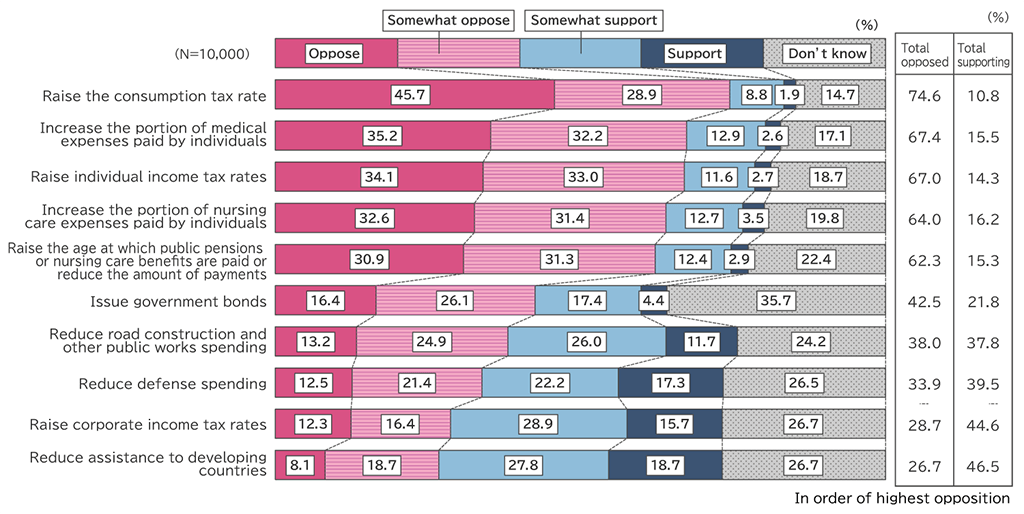4th Awareness Survey of 10,000 Women – Declining Birthrate and Raising Children40% consider 2 children to be ideal, while 70% oppose raising consumption tax to cover public costs
With the declining birthrate having become a major issue for Japan, in March 2023 The Nippon Foundation conducted its 4th Awareness Survey of 10,000 Women, on the topic of “Declining Birthrate and Raising Children,” to gauge Japanese women’s attitudes toward raising children against a backdrop of a declining birthrate.
While 40% of respondents replied that if they had no constraints, their ideal number of children would be two, one in five replied that they did not want to have any children. When asked about parents’ responsibility toward children’s growth, the top reply, at close to 40%, was that parents’ responsibility lasts until the legal adulthood, while more than 40% indicated a collapse of the public safety net including the medical and pension systems due to weaker public finances as their biggest concern regarding children’s future. In addition, the top expectations of the newly established Children and Families Agency were to address child poverty and to address the declining birthrate. With regard to the increase in public spending related to children that is the focus of attention in measures to address the declining birthrate, more than 70% oppose raising the consumption tax, more than 60% oppose increasing the portion of medical and nursing expenses paid by individuals, and more than 40% oppose issuing government bonds.
Notes:
- Survey coverage: 10,000 women across Japan aged 18 to 69
- Survey period: March 20-22, 2023
- Survey method: Internet survey
Finding: 40% of respondents consider two children to be ideal
If you had no constraints and could have as many children as you like, what would be the ideal number of children?

(Top three replies)
2 children – 39.9%
3 children – 24.5%
No children – 20.5%
Finding: To pay for increased public spending related to children, the three choices with the most opposition were raising the consumption tax rate, increasing the portion of medical expenses paid by individuals, and raising individual income tax rates, while the three choices with the most support were reducing assistance to developing countries, increasing corporate tax rates, and reducing defense spending.
How should funds be secured to pay for increased public spending related to children? What are your views on various choices?

- ※ Total opposed: “Opposed” + “Somewhat opposed”
- ※ Total supporting: “Support” + “Somewhat support”
Top three options facing opposition
- Raise the consumption tax rate – 74.6%
- Increase the portion of medical expenses paid by individuals – 67.4%
- Raise individual income tax rates – 67.0%
Top three options receiving support
- Reduce assistance to developing countries – 46.5%
- Raise corporate income tax rates – 44.6%
- Reduce defense spending – 39.5%
Survey Highlights
Until what age should parents be responsible for their children’s growth?
- Until legal adulthood – 37.8%
- Until they are independent and earning their own livelihood – 16.0%
- Until they are employed – 15.8%
What are your concerns regarding Japanese society in terms of children’s future?
- A collapse of the public safety net including the medical and pension systems due to weaker public finances – 41.8%
- A weakening of the labor force due to the shrinking population – 32.3%
- Increasingly violent earthquakes and other natural disasters – 27.5%
What are your particular expectations of the newly established Children and Families Agency?
- Address child poverty – 20.3%
- Address the declining birthrate – 18.4%
- Address child abuse – 16.9%
What should the national and local governments and companies do to reverse the declining birthrate?
- Raise wages – 33.4%
- Make education free or provide more financial assistance – 30.0%
- Strengthen public support for childbirth and child rearing – 28.2%
Will recognizing the rights of children born outside marriage lead to an increase in Japan’s birthrate?
- Don’t know – 45.2%
- Yes – 30.9%
- No – 23.9%
About the Awareness Survey of 10,000 Women
The international community has entered a period of major change, with Japan’s population decline and aging population caused by a declining birthrate among the world’s most advanced. Against this backdrop, The Nippon Foundation launched the Awareness Survey of 10,000 Women in July 2020, with a focus on how women’s role in society and values are changing and to shed light on the society of the future. The 4th Awareness Survey was carried out in response to the Kishida administration’s recent launch of the Children and Families Agency and the Children’s Future Strategy Council, on the topic of Japan’s “Declining Birthrate and Raising Children.” The Foundation plans to carry out further surveys of women on other topics in the future.
Contact
Public Relations Team
The Nippon Foundation
- Email: cc@ps.nippon-foundation.or.jp



